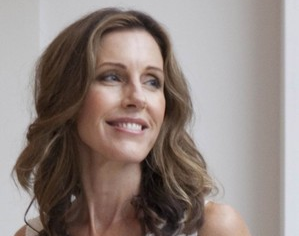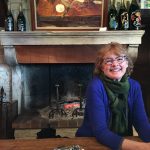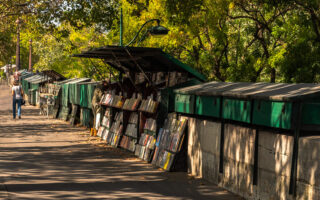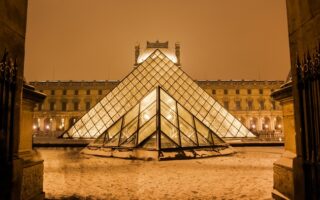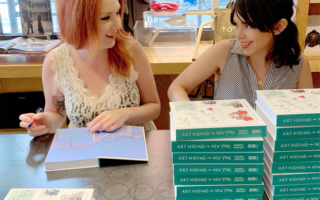Interview with Marcia DeSanctis
- SUBSCRIBE
- ALREADY SUBSCRIBED?
BECOME A BONJOUR PARIS MEMBER
Gain full access to our collection of over 5,000 articles and bring the City of Light into your life. Just 60 USD per year.
Find out why you should become a member here.
Sign in
Fill in your credentials below.
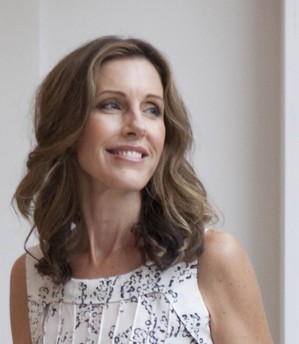 Marcia DeSanctis’s journalistic career began as a network television producer. Today she is an award-winning magazine writer, and most recently author of 100 Places in France Every Woman Should Go (Travelers’ Tales, 2014). She has been honored with three Lowell Thomas Awards, including one for Travel Journalist of the Year, for her essays on Rwanda, Paris and Russia. She has written about “sugar, marriage, Graham Greene, Haiti, and sex scandals” for publications such as Vogue, Town & Country, More, O The Oprah Magazine and The New York Times. At age 18, she first traveled to France, an experience she wrote about in an essay for Vogue, and ten years later, in 1989, she moved to Paris with her then-boyfriend, whom she married there. Currently she lives with her husband and her two children in northwest Connecticut. She recently took the time to answer Janet Hulstrand’s questions about her most recent work, the way she feels about France, and what’s next on her agenda.
Marcia DeSanctis’s journalistic career began as a network television producer. Today she is an award-winning magazine writer, and most recently author of 100 Places in France Every Woman Should Go (Travelers’ Tales, 2014). She has been honored with three Lowell Thomas Awards, including one for Travel Journalist of the Year, for her essays on Rwanda, Paris and Russia. She has written about “sugar, marriage, Graham Greene, Haiti, and sex scandals” for publications such as Vogue, Town & Country, More, O The Oprah Magazine and The New York Times. At age 18, she first traveled to France, an experience she wrote about in an essay for Vogue, and ten years later, in 1989, she moved to Paris with her then-boyfriend, whom she married there. Currently she lives with her husband and her two children in northwest Connecticut. She recently took the time to answer Janet Hulstrand’s questions about her most recent work, the way she feels about France, and what’s next on her agenda.
You’ve recently published “100 Places in France Every Woman Should Go.” Can you tell us how you came to write this book? And how did you go about choosing the places to write about?
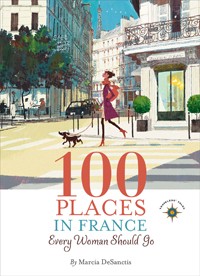 I have been writing lots of essays in the last couple of years, and many of them were anthologized by Travelers’ Tales, a publishing house in Palo Alto. So the editors–great guys—were familiar with my work about France. They approached me about tackling this book and I said “Yes” in about half a second. I was terrified, to be honest. I don’t live there, for one, and two, I had to pull it together rather quickly. So I made a list, and another list, and another list, planned four whirlwind trips to France, and relied on my memories, my diaries, as well as the suggestions of others–friends, mostly, and my husband, who forgets nothing.
I have been writing lots of essays in the last couple of years, and many of them were anthologized by Travelers’ Tales, a publishing house in Palo Alto. So the editors–great guys—were familiar with my work about France. They approached me about tackling this book and I said “Yes” in about half a second. I was terrified, to be honest. I don’t live there, for one, and two, I had to pull it together rather quickly. So I made a list, and another list, and another list, planned four whirlwind trips to France, and relied on my memories, my diaries, as well as the suggestions of others–friends, mostly, and my husband, who forgets nothing.
The book is not a compendium of the most important cultural attractions – there is only one chapter on the Loire chateaux, for example, which would be a crime if this were a book about France’s most significant sites. But it’s not. It’s a book about experience, and how we as women move differently through this deeply sensual country. And how France can have almost mystical transformative powers.
To come up with just 100, I asked myself five questions: First, is there a story of a great woman around which I could frame the piece? For example, the Château de Grignan is entwined with the history of Madame de Sevigné, who has a pretty remarkable story. Second, is it something so beautiful that we fall to our knees in awe? Vaux le Vicomte, for example. Giverny. The dark mountains of the Auvergne. Third, is it a place with a strong personal affinity for me, such as St. Tropez, but is also poetically, femininely French? Fourth, is it a deeply iconic experience–like celebrating Bastille Day on the Champs Elysées? Or tracing the history of silk, and hence couture, and hence fashion, in Lyon? Finally, was it a place about which another woman could tell a powerful story better than I could? My friend Jeannie, for example, has a great love for Annecy and I wanted to include her take – why this place with its turquoise water and clear air is something we must experience in this life. In every case, I tried to convey something besides destination. Not just where to shop in Paris, but why. Not just my recommendation to visit the menhirs at Carnac, but why.
Mostly, I was looking for good stories to tell – about places, experiences or moments that can be appreciated from the point of view of a female traveler and also places that have a story about a woman who changed the history of France–and in some cases, the world.
What is one of the most interesting things you learned in the process of writing your book? And/or the most surprising?
Definitely the research was the most interesting. I immersed myself in a lot of great writers who wrote about France, from Henry Adams to Thomas Jefferson and the letters of Abigail Adams, which she wrote when her husband John was stationed as a diplomat in Paris. I loved her outsider’s vantage point. I finally read the autobiographies of MFK Fisher, Simone de Beauvoir and George Sand. And one of my touchstones was Edith Wharton’s A Motor Flight through France. The point was to try to see France through someone else’s eyes. Most enlightening was the non-fiction writing of Colette. I can’t tell you how many times I read her 1944 essay “Paris from my Window.” There has never been a more passionate love letter to France.
Most surprising was to delve deeply into the story of Joan of Arc, France’s patron saint, and to follow her trail from Domrémy-la-Pucelle to her death in Rouen. She is a constant source of astonishment, especially the fact that Mark Twain devoted 14 years of his life to writing a biography of her, and that he considered his Personal Recollections of Joan of Arc to be his finest work. I always doubted the veracity of her story. I’m not sure why, other than that it is so outlandish – I mean she was the age of a high school junior when she commanded the armies of France! But once I read the minutes of her trial, I shed my doubts.
What was the greatest challenge in writing this book? What was the most fun?
The greatest challenge was narrowing my list down. I felt like I was personally slighting Chartres, the Fondation Maeght, and other things that are not in the book for no reason other than the fact that I didn’t have a new enough, female-centric reason to cover it. Another challenge is one all of us who write about France confront: how to take this subject that has been covered to smithereens, and offer something new and different. I didn’t want to overdo the girlier tropes we all love about France–shopping, champagne, perfume, chocolate–even though I wrote about all of those. I hoped to avoid some of the most obvious generalizations about women, romance, and France. I was inspired by the task: how to convey my love for the country and its inescapable sensuality in a relatively fresh way.
The last challenge was to take all the stories that were fascinating me, and integrate them into essays while maintaining a light enough hand. I want the reader to share my obsessions and learn something, but not to feel oppressed by too much historical detail.
Of the 100 places you write about in your book, do you have a favorite, or maybe 2-3 favorites? What is it that you particularly love about these places?
My favorite place in France is any table in the sun with a glass of rosé. That is the truth. But also, I love the hikes I write about in Provence–the Calanques, the Esterel and the Gorges du Verdon. These places are gorgeous. I love the villages of the Côte Basque. I feel at home there, utterly safe and at peace. I love St. Jean de Luz, to have a simple meal of jambon de Bayonne and Ossau-Iraty sheep’s chest, and to walk through town in new espadrilles that cost 10 Euro. In Paris, I love the Palais Royal. I had my wedding reception there, and it is also where Colette grew old and great. Under the rows of linden in springtime, it’s perfection.
How or why were you drawn to France in the first place? When did you first spend time here, how much time did you spend, and what kind of an experience was it?
I studied French since seventh grade and was always drawn to Paris, as so many young women are. One of my French teachers had a crush on Catherine Deneuve. Tacked on the wall of another classroom was an album cover of Françoise Hardy. Remember her amazing bangs? These women were so alluring, they hardly seemed real. I heard Audrey Hepburn say (in Sabrina)–and I remember this—“In France, I learned how to live.” Then, I learned the story of Marie Antoinette. How could a 13 year-old be married off and made queen? And her castle is still there? And she was guillotined? There were great mysteries to unravel, and France was my way into the heart of them.
You married your husband during a four-year period when you were living in Paris. What were you doing there during that time? Is that also where you met him? And is he French?
I met my very American husband my freshman year at Princeton, but we didn’t start dating until several years after our graduation. In 1989, I got a fellowship to write for a magazine in Paris, so I left ABC News, where I was working at the time, and we moved to France together. At the time, he was working a lot in Italy in the marble quarries – he is a sculptor, and it was nice to be close to Carrara. We stayed on for several years and once my fellowship was over I went back to work, first for ABC and then for 60 Minutes in the Paris bureau. It was a charmed moment in our lives. He had a studio adjacent to Père Lachaise and we bought an apartment in Ménilmontant, in the 20th. We were married by then – the wedding was in the mairie of the 3rd arrondissement, and dinner après was at the Grand Véfour. It was a gorgeous September day.
What do you love most about France and the French?
First of all, I do not think French people are rude. I honestly have never understood that characterization. Of course, occasionally I have encountered jerks in France as I have in almost every country in the world, the U.S. included. But I find French people to be among the warmest and most welcoming people on the planet.
I love how guiltlessly French people go through life. Eat the chocolate, drink the wine, for the love of God eat the gluten, the lactose, the meat, the butter! That’s one thing. I also love how they integrate their culture into every aspect of their existence. How a medieval cathedral just randomly lords over a small town somewhere, and how absolutely no one takes it for granted–and everyone in the village can tell you the history of the church and about the saint it was named for, and where the stone it was constructed from was quarried.
Do you have anything to say about the recent events in Paris that have so shaken everyone who loves it? Anything to say to those who might hesitate to go to France now because of what happened?
The terrorist attack was a dark and horrible event, and so very tragic. And my opinion is and will remain: there is every reason to go to France now, and not to fear travel there–or anywhere else. Right now, France is wounded and will be permanently scarred. I lived in New York during 9/11, and tourists were encouraged to come and show support. I plan to do the same for France. No one will mess around with my safety or anyone else’s there, I trust that completely.
What are you working on now?
I am working on a memoir about marriage and travel. In my case, the two are very much related. Also, soon I will be contributing to an online travel magazine called Off Assignment that was created by a colleague and friend. It’s still in its infancy but it’s going to be an incredible place for great writing and writers. I will be co-editing one of the sections, so I’m really excited about that.
Photo credit: Ron Haviv
Janet Hulstrand is a writer, editor and teacher based in Silver Spring, Maryland. She teaches literature classes at Politics & Prose bookstore in Washington, D.C. and Writing from the Heart workshops in France and in the U.S. Each summer she teaches “Paris: A Literary Adventure,”in Paris for the Queens College, CUNY Education Abroad Program. Click on her name to learn more about her, and to read her essays published by Bonjour Paris.
More in Interview, Marcia DeSanctis
